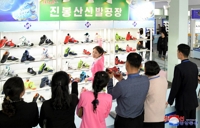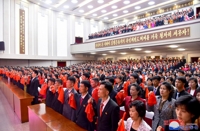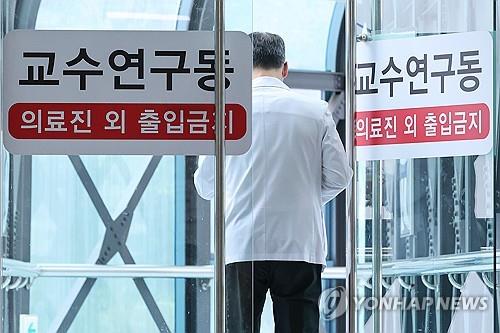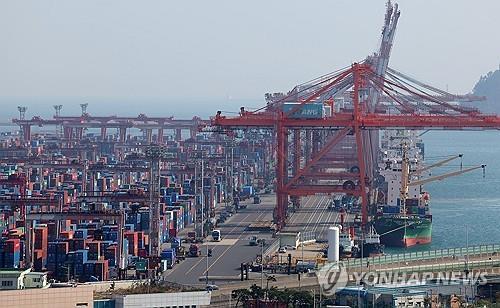(EDITORIAL from Korea Times on April 15)
Global chip battle
Korea should beep up semiconductor industry
U.S. President Joe Biden has stressed the importance of the semiconductor industry and pledged to make huge investments in the area. During a virtual meeting hosted by the White House, Monday, Biden said, "We're investing aggressively in areas like semiconductors and batteries; that is what they're doing and others, so must we."
The meeting was attended by CEOs of major companies like Samsung Electronics, Taiwan Semiconductor Manufacturing Company (TSMC), Intel, General Motors and Ford. Biden, apparently aware of the rise of China in the chip making industry, said, "I've been saying for some time now ― China and the rest of the world is not waiting, and there's no reason why Americans should wait."
Holding up a silicon wafer, he underlined the significance of the infrastructure industries including electric vehicle (EV) batteries and 5G communications. Fresh from the meeting, Intel CEO Pat Gelsinger said the company's goal is to start production of automotive semiconductors within six to nine months.
The White House convened the meeting to cope with the stalled production of vehicles in the United States due to the shortage of semiconductors. Yet the Biden administration appears to be attempting to create a semiconductor alliance comprising major enterprises of its allies and partners with the goal of keeping the upper hand over China in the strategically important chip sector.
This means the Biden administration is eager to fortify its grip on the sector for the sake of beefing up national security. In a similar vein, the U.S. had actively engaged in the EV battery dispute between LG Energy Solution and SK Innovation in an apparent bid to expand the U.S. domestic supply chain, helping the two Korean firms agree to settle their issue over trade secrets.
Semiconductors have already become essential to national security beyond their industrial value. Asian nations such as South Korea and Taiwan account for 72 percent of the entire global production of semiconductors, compared with the U.S.' 12 percent. China's self-sufficient rate for chips reached 15.7 percent in 2019. It has been desperate to raise the rate to 70 percent by 2025 and has been mobilizing all possible means by recruiting experts and developing technologies.
The growing tensions between the U.S. and China have put domestic chipmakers like Samsung Electrics and SK hynix in an increasingly difficult position. Samsung, which is operating a plant in Austin, Texas, has been pressed to make further investments in the U.S. However it found it hard to comply with the U.S. request on fear that its factory operation in China might be negatively affected by the growing Sino-U.S. rivalry in not only geopolitics but also trade and technology. China is South Korea's largest trading partner, while the U.S. is its traditional security ally.
Semiconductors are a key industry for Korea, accounting for 20 percent of the country's entire exports. The only way to cope with the growing challenges is for Korean companies to maintain a competitive edge over their global rivals by expanding investments, nurturing human resources and strengthening research and development. The government should push for deregulation and innovation, promote entrepreneurship and engage in proactive trade diplomacy. It should also step up cooperation with the business sector to ease the semiconductor shortage and hone the global competitiveness of the country's chip making industry.
(END)
-
 S. Korea marks 30th anniv. of Korean Pavilion at Venice Biennale with contemporary art
S. Korea marks 30th anniv. of Korean Pavilion at Venice Biennale with contemporary art -
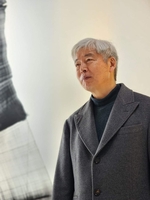 Artist Lee Bae captures ethereal Korean aesthetics at Venice Biennale
Artist Lee Bae captures ethereal Korean aesthetics at Venice Biennale -
 Ateez member Yunho throws first pitch at MLB match between Dodgers, Mets
Ateez member Yunho throws first pitch at MLB match between Dodgers, Mets -
 Gov't likely to accept university chiefs' request to lower med school enrollment quota
Gov't likely to accept university chiefs' request to lower med school enrollment quota -
 S. Korea supports resolution backing U.N. membership of Palestine
S. Korea supports resolution backing U.N. membership of Palestine
-
 Artist Lee Bae captures ethereal Korean aesthetics at Venice Biennale
Artist Lee Bae captures ethereal Korean aesthetics at Venice Biennale -
 S. Korea marks 30th anniv. of Korean Pavilion at Venice Biennale with contemporary art
S. Korea marks 30th anniv. of Korean Pavilion at Venice Biennale with contemporary art -
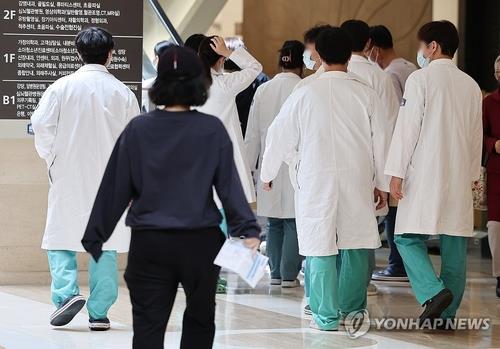 Gov't likely to accept university chiefs' request to lower med school enrollment quota
Gov't likely to accept university chiefs' request to lower med school enrollment quota -
 Looming weekly closure of major hospitals feared to worsen medical service crisis
Looming weekly closure of major hospitals feared to worsen medical service crisis -
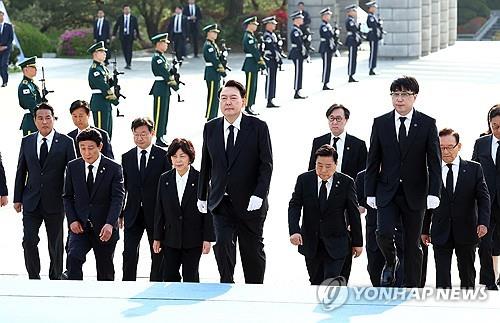 Yoon's approval rating sinks to lowest point since taking office
Yoon's approval rating sinks to lowest point since taking office
-
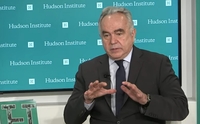 U.S. will take steps for three-way engagement on nuclear deterrence with S. Korea, Japan: Campbell
U.S. will take steps for three-way engagement on nuclear deterrence with S. Korea, Japan: Campbell -
 (LEAD) Hybe to file complaint against sublabel executives over internal conflict
(LEAD) Hybe to file complaint against sublabel executives over internal conflict -
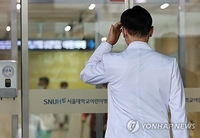 Looming weekly closure of major hospitals feared to worsen medical service crisis
Looming weekly closure of major hospitals feared to worsen medical service crisis -
 Author of ADOR's 'internal document' refutes allegations of spinoff plot
Author of ADOR's 'internal document' refutes allegations of spinoff plot -
 U.S. SPACECOM commander says N.K.'s satellite launch violates U.N. resolutions
U.S. SPACECOM commander says N.K.'s satellite launch violates U.N. resolutions
















